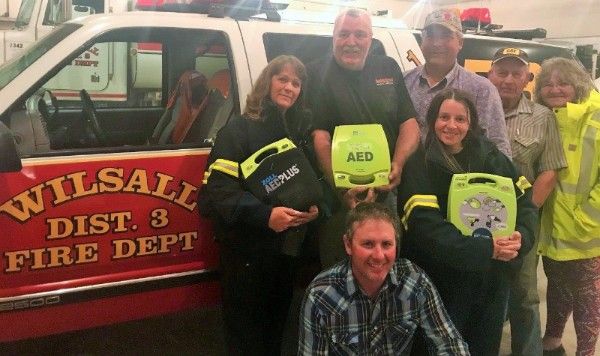Serving Our Rural Communities
For a heart attack victim, each passing minute t can mean the difference between life and death.
But for rural residents surrounding Wilsall, it takes a half an hour or more for an ambulance to arrive from Livingston or for the rescue squad to drive a victim of cardiac arrest to the hospital. That’s why it’s essential for volunteer fire departments like the Wilsall Rural Fire District to have updated, life-saving equipment such as automated external defibrillators known as “AEDs.”.
With the help of a Park County Community Foundation grant, the Wilsall Fire Department recently purchased two new AEDs along with an additional device to train on.
The new equipment helps the volunteer fire department better serve the Shields Valley’s aging population, said Sue Scott, a volunteer.
“(This equipment) is critical in this area,” Scott said. “We get quite a few cardiac calls a year. (An AED) is the first thing that goes on a patient when there’s a concern about cardiac arrest. Without, it puts us at a significant disadvantage.”
An AED analyzes heart rhythms and delivers an electric shock to restore heartbeat to normal. Immediate CPR and defibrillation can more than double a victim’s chances of survival, according to the American Heart Association. For every minute that passes without CPR, the chances of survival after a cardiac event decrease by seven to 10 percent, AHA data shows.

Like the county’s other rural fire departments, the Wilsall Fire Department has a small budget and was getting by with old equipment. Greg Coleman, director of the county EMS services, said some fire departments in the county are operating with equipment almost 20 years old. Wilsall volunteers were using AEDs that were 15 years old. The original manufacturer no longer made those models and the department had trouble finding replacement batteries.
“We were always concerned,” Scott said. “Were these machines about to die completely?”
The new AEDs have increased the confidence of volunteers, said Judy Jenkins, another volunteer. That’s important because, like other rural fire departments in Park County, Wilsall’s call volume has steadily increased in the past few years. More than 80 percent of their calls involve some sort of emergency medical situation.
“When you live in a rural area when the response time can be 30 minutes, it’s important for the rural fire department to be able to respond,” Coleman said. “If it’s not in the budget we make do with what we have. Really, this is helping us better serve the public.”


